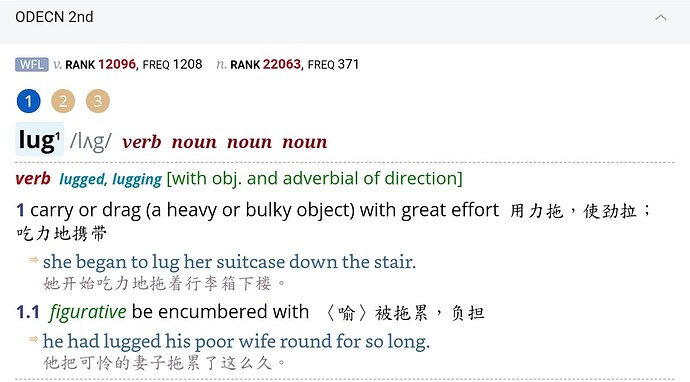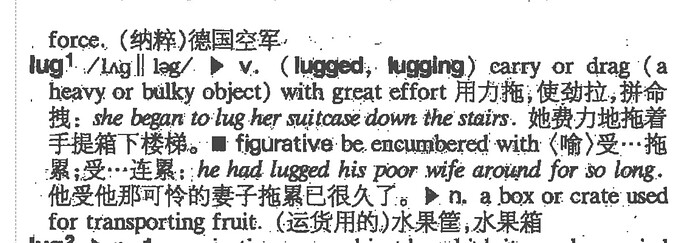新牛津将he had lugged his poor wife for so long 翻译成他把可怜的妻子拖累了很久,意思是妻子受到他的拖累之意。
译文社牛津翻成他受到他妻子的拖累很久了。
我个人认为显然,是译文社翻译的是正确的,因为lug sth around是sth拖累了主语,换成sb.就是某人是主语的拖累。不知道大家的看法如何?
个人认为是把,不是被
他把他可怜的妻子拖累了这么久,他的妻子是受拖累的对象。
译文社这是把 “他”变成受拖累的对象? 那为什么不用 had been lugged by?
我猜是受到了英文释义be encumbered with的影响,be encumbered with翻成受拖累是对的,但是在例句翻译的时候可能也受到了这个影响,下意识翻成被拖累了。这种低级错误按理说校对的时候应该能发现。
The whole process was encumbered with bureaucracy.
整个进程受到官僚主义的阻碍。(来自朗5)
He was encumbered with his poor wife for so long.
He had lugged his poor wife round for so long.
他受她可怜的的妻子拖累已经很久了。
通过词义替换可知译文社对lug的翻译是对的。
另外,poor被翻译成“可怜的”,我觉得不妥,他被拖累了,可怜的不是他吗?如果有具体语境的,我觉得句中poor应该含有贬义。
poor不能这么翻,因为结婚誓言里有云 for richer, for poorer,所以穷苦不能成为拖累的理由。
我也认为译文社牛津翻译是对的,个人认同
因为楼上意见不同,我去祭了一下Google大法,楼上的是对的,我理解错了 ![]()
Google Books显示这句话出自《A Woman Of My Age》
这段的上下文是
‘Vive la difference,’ he said, and grinned so cheerfully at this silly joke that couldn’t help smiling back. Why shouldn’t he be cheerful and silly? He had lugged his poor wife round for so long, like a heavy suitcase. Away from her, he must feel like a boy let out of school. Poor old man, I thought, and when he said, with his daring’ look, This is a great treat for me, you know. I don’t often get the chance to take out such an attractive young woman,’ and put his hand on my knee, I put my hand on top of his and held it there.
所以这句话实际上适合直译“他拖着他可怜的老婆走了这么久,就像拖着一个沉重的行李箱。 ”
厉害了,上下文都有,感谢提供context。
我也是随便试试能不能搜到。结果证明这些词典的例句真的来自真实语料库,不是编辑自己编的 ![]()
说实话我觉得这种比喻义根本不用记,根据上下文自然能体会出这个意思。就像这句话,如果有中译本的话我觉得此处也会直译,读者自然能体会出“拖累”的意思。
我查了好多词典都没有收这个义项。
上海外语教育出版社活干得也太糙了。常用结构都翻错。过些年新牛津大修,应该就不会有这种低级错误了,如今再愚蠢的译者也知道参考机翻。

